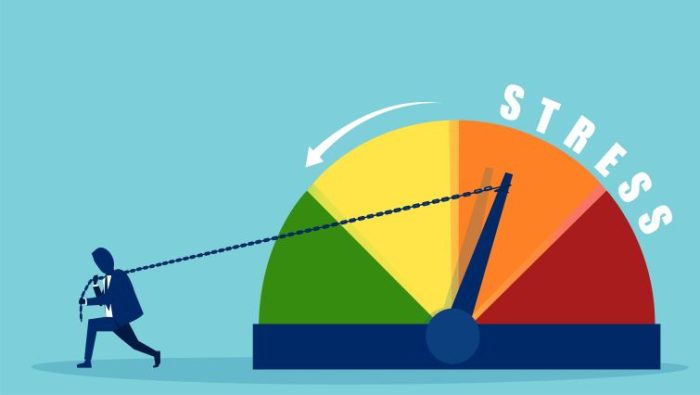6 Best Ways To Deal With New Job Stress
 Publié le 22 July 2022
Publié le 22 July 2022
Step into a new job role feeling confident and calm with the 6 best ways to deal with new job stress.
You’ve sent your resume, nailed the job interview, and received an offer, now it’s time to start your brand new job. It’s exciting, but all can be quite nerve-wracking, to step into a new work environment. It’s normal to experience a bit of anxiety before starting something new, but not to the point that it starts to negatively affect you. Utilize the 6 best ways to deal with new job stress, and you’ll step into your new workplace feeling confident and prepared for success.
6 Best Ways To Deal With New Job Stress
- Take notes
- Learn by example
- Ask questions
- Introduce yourself
- No snap judgements
- Don’t panic
Take Notes
Starting any new job requires a great deal of onboarding and training to learn all the ins and outs of the position. There are procedures, programs, workflow arrangements, usernames and passwords, and more, all of which must be remembered for future use. It would be a mistake to assume that you will be able to retain all this information, as the human brain simply is not capable of successfully retaining that much new information. Fortunately, there is a simple solution: take notes.
Writing down important information, processes and all usernames and passwords is one of the best ways to deal with new job stress. You will have all the important information you need to perform your job right at your fingertips, and it’s been proven that the act of writing something down dramatically increases your chances of remembering it.
If you are worried that relying on and taking notes will somehow negatively affect your reputation with managers and supervisors, it’s important to remember that note taking is a major sign of active listening. Managers should take this as a sign that you are determined to do everything possible to retain important information and be able to work on your own as quickly and efficiently as possible.
Learn By Example
Part of establishing a learning culture in the workplace is understanding that people have different styles of learning. Some learn best by being provided all the necessary information and allowed to study at their own pace. For many, however, learning by example is one of the most efficient ways to learn new information and deal with new job stress.
Having someone who understands the daily demands and requirements of the job role walk you through the process is hugely beneficial. They have firsthand knowledge and hands-on experience performing the role, and will undoubtedly have valuable insights, tips and tricks. Learning from their examples will save you valuable time, and ensure a smooth transition which allows you to perform at your best right away.
Ask Questions
If there is any uncertainty at your new job that is causing you undue stress, the simplest way to address it is to ask questions. Many people hesitate to ask important questions because they are afraid it will make them appear uninformed or ill-equipped for the job. Speaking up and asking questions can cause stress and anxiety, especially for those who don’t like attention.
It’s important to remember that asking questions is an essential part of any training and onboarding process. Going into a new job with the pressure of understanding everything instantly without any follow-up is not realistic, and only serves to put unnecessary pressure on yourself. Leaders and supervisors should always make it known that questions are not only encouraged, but expected, as it will ensure that any potential issues are addressed immediately.
Introduce Yourself
Meeting new people can be hard, and stepping into a work environment where everyone has been functioning together as a team for a long period of time can be a challenge. It is easy to feel like the odd-person out, surrounded by people who know each other well. One of the best ways to deal with new job stress from feeling out of place is to make an effort to become a real part of the office.
Introduce yourself to your new colleagues, and make a concerted effort to remember and learn about them. Remember that each of them was once the new person in the workplace, and felt the same nervousness as you are currently experiencing. Workplace leaders should also take the opportunity to arrange for team bonding opportunities like going out for lunch, socializing after work or even just hanging out by the water cooler in order to build strong professional relationships.
No Snap Judgements
A snap judgment is one you make quickly based on little to no information, and hold onto despite evidence to the contrary. The old saying about how you only have one chance to make a first impression? That’s a form of snap judgement. It would be disingenuous to say that first impressions have no impact whatsoever, this is why it’s important to present yourself as a competent professional during the first day in the new workplace.
You must remember, however, that everyone wants to be given the benefit of the doubt just as you do. Your demeanor will of course evolve over time in your role as you grow more comfortable in the workplace. Your colleagues will start to know you beyond just the surface level, as you will with them. You want to be given the space and opportunity to evolve, learn and grow professionally, and you must also be willing to provide this to your colleagues. If you resist the urge to make snap judgments about everything around you, you will feel it is less likely that these judgments will also be made about you.
Don’t Panic
Feeling stress and anxiety when starting a new job is completely normal. It is an unfamiliar situation, surrounded by new people and trying to adapt to a whole list of new responsibilities. It’s important to remember that everyone has experienced being the new person on the job, and they want you to feel comfortable and adapt to the environment as quickly as possible.
Panicking will not help you adapt to the new environment. Starting a new job requires a lot of work and effort, but soon it will feel familiar and comfortable. Just remember that you can only learn one part of the job at a time, and don’t try to take on everything all at once. Focus on what you can accomplish on any given day, knowing that you will be able to tackle the next tasks and steps in the process tomorrow. Stay calm, work hard and be open to new things, and you’ll be succeeding in your new job in no time.
Starting a new job is exciting and anxiety-inducing in equal measure. It represents an opportunity to grow and develop professionally in a new work environment. Don’t let nerves derail your first day on the job with the 6 best ways to deal with new job stress. Remember to take a deep breath, stay calm and work hard, and you’ll quickly be on the path to success.







